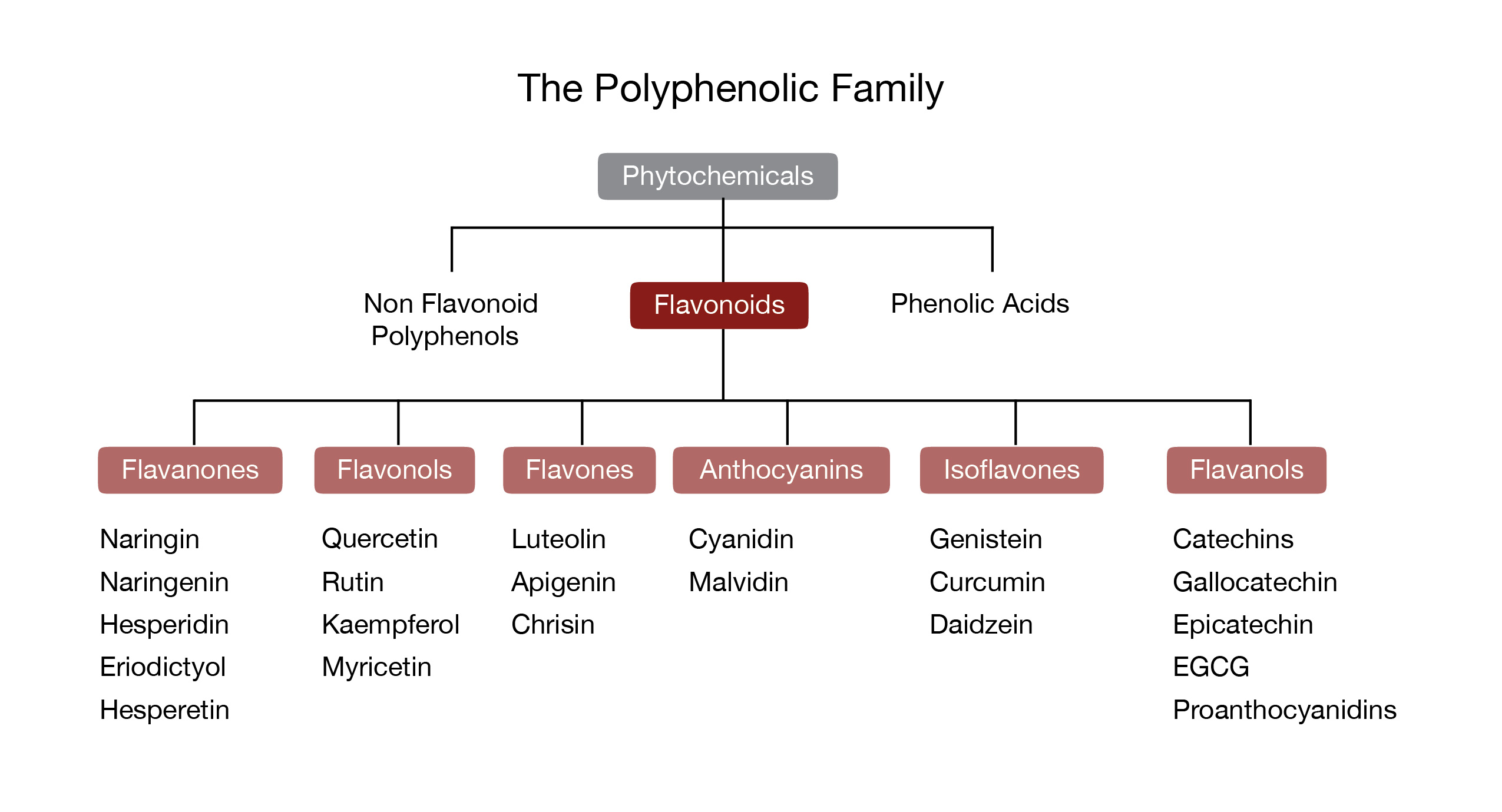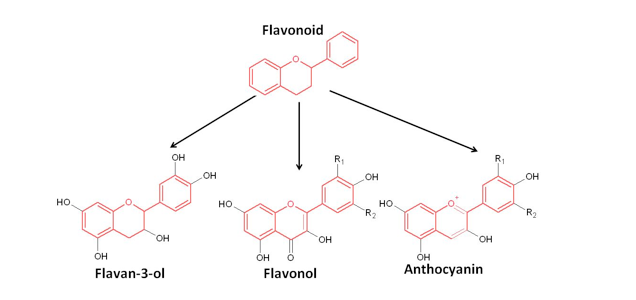Cocoa powder, a food and beverage ingredient made by processing cacao beans, is made into chocolate by recombining it with cocoa butter (also from the cacao beans), sugar, and for some products (milk chocolate) also with milk. ‘Dark’ chocolate has a proportionally higher cocoa powder content and a lower sugar and cocoa butter content.
Cocoa contains a variety of compounds referred to as polyphenols [FIGURE 1, FIGURE 2]. Flavonoids are a subset of polyphenols, Flavanols, a further subset, and proanthocyanidins (PACs) and flavan-3-ols further subsets. The latter are referred to as monomers – the former are chains of monomers. All polyphenols demonstrate antioxidant capacity, but researchers in this field lean toward the theory that the physiological consequences of consuming polyphenols in general and flavanols in particular are not a function of antioxidant capacity, but rather a direct effect on cell-to-cell signaling and gene expression.
FIGURE 1: Polyphenols subsets
Cocoa bean extracts, cocoa, dark chocolate, and for that matter, other food sources of flavanols such as red wine, dark-colored fruits and berries, green tea, grape seed extract, certain tree bark extracts and nut skin extracts… have all been tentatively identified as having cardiovascular and possibly cognitive benefits. Some of the research attributes some of these benefits to the anthocyanin content of fruits and berries, these compounds being responsible for the red-to-purple-to-blue colors of blueberries, grapes, etc.
FIGURE 2: Chemical structure of example flavonoids
COCOA AND MOOD
There is mixed evidence that consuming chocolate can improve mood. The uncertainty is compounded by not knowing if effects are due to the cocoa (polyphenol) content, the sugar and fat that are also part of chocolate, or the psychological self-reward aspects of eating a sinful luxury snack. Scholey and Owen reviewed the human trial literature, taking care to exclude studies that were of flawed design, execution or interpretation. Of eight studies meeting their inclusion criteria, five showed either an improvement in mood or an attenuation of negative mood.1
Two more recent studies presented conflicting results. One provided healthy subjects with 30 day’s of chocolate drinks containing 0, 250 or 500 mg of cocoa polyphenols. At the end of 30 days the high dose group reported significantly increased self-rated calmness and contentedness relative to placebo. Cognition was unaffected.2 The other study was 28 days of caloric restriction with or without a cocoa extract that contained 645 mg/day of polyphenols. Again, healthy subjects. No change in anxiety scores. Both group had reductions in depressive symptom scores, but no significant difference between the groups.3
Untested, so far, is any assessment of the effect of cocoa polyphenols on mood in people who are diagnosed as depressed or prone to depression. Martin reported that milk chocolate but not dark chocolate reduced anxiety in subjects who started with high anxiety. Mood/depression was not assessed.4 A population study enrolling 1,018 adults were asked to report mood/depression state and amount of chocolate they consumed. Those with low depression scores reported eating chocolate 5.4 servings per month, mid-range scores 8.4 servings/week and clinically depressed 11.8 servings/week. The authors pointed out that there was no way to determine if chocolate caused depression or depression led to eating more chocolate. No information on type of chocolate.5
In conclusion there is some interesting research that cocoa flavonoids may contribute to positive mood. At a minimum, it belies the saying that something has to taste bad to be “good for what ails you.”
OTHER HEALTH BENEFITS
Outside the scope of this review are various other health claims made for cocoa flavonoids. Various meta-analyses and systemic review provide evidence that consumption of chocolate in general or cocoa flavonoids, i.e., ‘dark’ chocolate, have cardiovascular benefits such as modestly lowering total and LDL-cholesterol, systolic blood pressure in people with elevated blood pressure, improved artery wall flexibility (as measured by flow-mediated dilation) and insulin sensitivity, and lower risk of stroke and cardiovascular disease. Most of these review conclude with a recommendation that larger and longer trials are needed to confirm these findings, and to establish an effective flavonoid dose.6-13 Improved vascular health might be expected to improve cognitive function, especially in the context of vascular dementia. Reviews explored the evidence and potential for cocoa’s neuromodulatory properties. There is some interesting, preliminary evidence that there may be benefits.1,14,15




